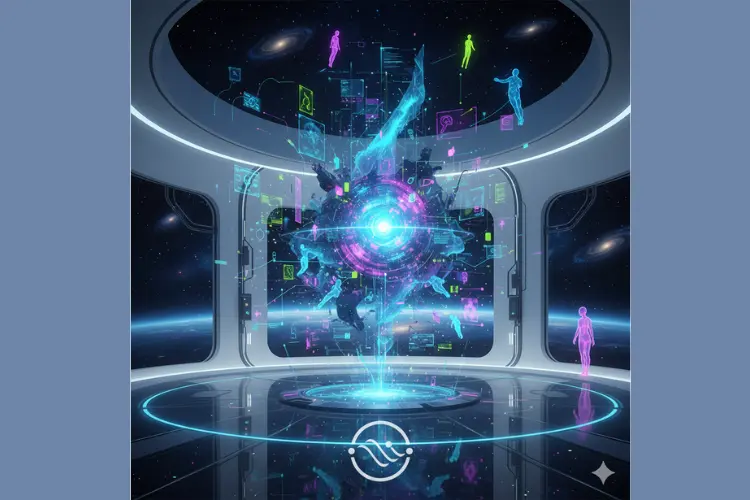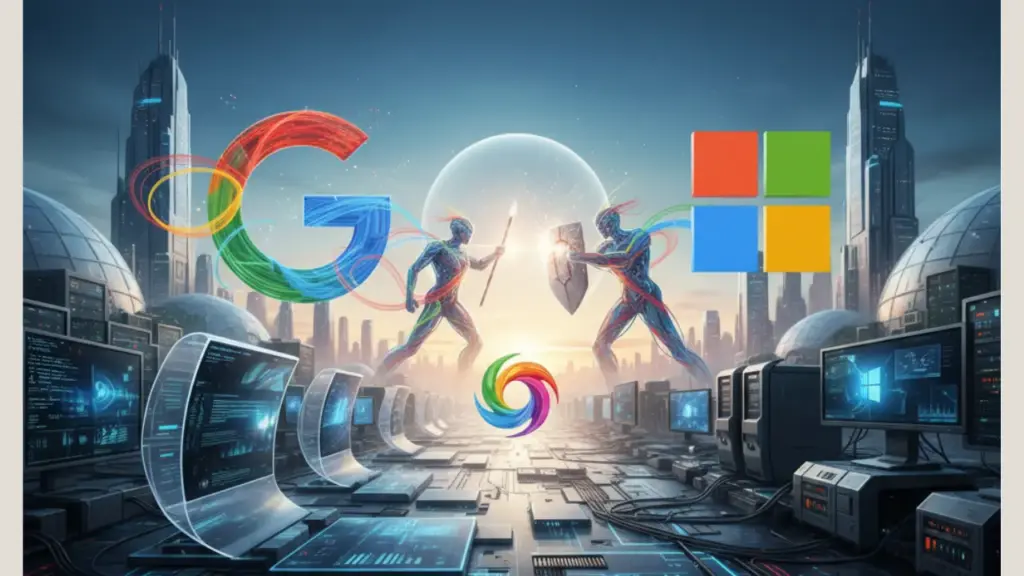Introduction
For years, Microsoft dreamed of merging the phone and the PC into one seamless ecosystem. From Windows Phone to the Surface Duo, the company tried everything—and failed spectacularly.
Now, Google has stepped onto the stage with Qualcomm and boldly declared, “Hold my coffee.”
During the announcement, Qualcomm’s CEO said, “I’ve seen it. It is incredible.” Those words sent shockwaves through the tech world. When was the last time you heard a CEO gush about an unreleased product like that?
But this isn’t another Chrome OS refresh or Android tablet experiment. Google is launching a full PC operating system, designed to rival Windows. More importantly, it’s bringing the entire Android ecosystem along for the ride.
After two decades of watching the PC and mobile markets evolve, it’s clear — this move could redefine computing for developers, businesses, and users everywhere.
Why Microsoft Failed at the Unified Experience
Let’s start with history. Microsoft wasn’t wrong about the vision — one ecosystem for all devices makes perfect sense. The execution, however, was flawed.
The Windows Phone promised to connect your devices, but it lacked the one thing users cared about most: apps. Developers didn’t buy in. Then came Continuum, a feature that let phones transform into PCs when docked. Cool concept, but again, too early, too limited, and too isolated.
Even the Surface Duo, a foldable Android device backed by Microsoft’s hardware expertise, couldn’t save the dream. By the time it arrived, Android and iOS had already dominated the mobile space.
The problem wasn’t ambition — it was ecosystem fragmentation. Microsoft built hardware and software that didn’t attract developers or integrate seamlessly with users’ digital lives.
That’s exactly where Google has the upper hand today.
The Game-Changer: Google + Qualcomm Join Forces
At the recent event, Google unveiled its vision for the next generation of computing—and Qualcomm is its perfect ally.
Qualcomm’s new chips aren’t just faster—they’re AI-powered, energy-efficient, and optimized for both mobile and PC environments. These processors are designed to make laptops run like smartphones: instant-on, always-connected, and deeply integrated with cloud intelligence.
Google plans to use these chips to power its new Android-based PC operating system, effectively bridging the gap between mobile flexibility and desktop power.
And unlike Microsoft’s past attempts, Google is not starting from scratch. It already has billions of Android users, millions of developers, and a massive app ecosystem ready to go.
This isn’t about competing with Windows—it’s about outgrowing it.
The Vision: A True Android-Powered PC
Imagine booting up your laptop and seeing not Windows, but Android — not the mobile version, but a full desktop experience. Every app from your phone works. Every file syncs instantly. Notifications, messages, and even calls appear on your screen without any setup.
This is what Google is building: a unified experience across every device.
In essence, your phone becomes your hub, and your PC becomes an extension of it. Developers can build once and deploy everywhere. Businesses can simplify IT infrastructure. Users get a consistent environment whether they’re on mobile, tablet, or desktop.
Apple achieved this synergy with macOS and iOS through its M-series chips. Google and Qualcomm are taking that idea even further — merging the mobile-first Android ecosystem directly into the PC world.
This isn’t a Chromebook update. It’s the birth of the Android PC era.
The Developer Advantage: A New Frontier for Innovation
For developers, this shift is monumental. It’s not just a new OS—it’s a new opportunity.
Developers have always struggled to build cross-platform apps that perform equally well on mobile and desktop. With this Android-powered PC OS, those boundaries vanish.
You can build once using Android Studio or Flutter and deploy the same app seamlessly across every device. Imagine productivity tools, design apps, and even games running natively on PCs without needing Windows or macOS.
This could also redefine the role of the fractional CTO. As startups and growing businesses adapt to multi-device strategies, fractional CTOs can lead teams through integration, optimization, and strategic adoption of this ecosystem.
It’s not just about code—it’s about shaping digital strategy.
The Business Impact: Efficiency, Flexibility, and AI Integration
From a business perspective, Google’s new PC OS could reduce friction, lower costs, and simplify tech operations.
Enterprises have long been locked into the Windows ecosystem because of compatibility and familiarity. But with Android apps running natively on powerful PCs, businesses can now adopt cloud-first, AI-enhanced workflows that work anywhere.
Imagine a company where every employee’s phone, tablet, and PC are synced in real time. Data security improves. Collaboration becomes instant. App deployment takes seconds, not days.
Add Google Workspace, AI tools, and Play Store integrations — and you get a computing environment built for productivity and flexibility.
This unified ecosystem could redefine how startups, enterprises, and even governments operate in a connected world.
The Competitive Landscape: Google vs. Microsoft vs. Apple
We’re witnessing a new tech war — not about devices, but ecosystems.
- Microsoft still dominates enterprise computing, but its mobile relevance is gone.
- Apple has mastered integration but keeps its ecosystem tightly closed.
- Google, however, is blending openness, cloud power, and AI intelligence into one seamless experience.
Timing is everything. Google’s move comes at a moment when AI computing is reshaping the industry. With Qualcomm’s chips, Google can integrate AI directly into the hardware—offering real-time translation, predictive tools, and enhanced app experiences.
Microsoft may counter with AI-driven Windows updates, but it faces legacy constraints. Google, unburdened by the past, can move faster and innovate freely.
If successful, this could be the first real competitor to Windows PCs in over three decades.
The Future of Computing: Beyond Devices
This shift signals the dawn of a device-agnostic era. The walls between your phone, tablet, and PC are disappearing.
In this future, your data follows you—not your device. Your desktop could live in the cloud. Your phone could run enterprise-level software. You’ll no longer think about where your work happens; it will just happen.
AI will make this experience even more powerful. Imagine an assistant that understands your habits across devices, preloads your apps, manages your files, and suggests smarter ways to work.
This is where the synergy between Google’s software and Qualcomm’s AI hardware could completely redefine what “computing” means.
The next evolution of personal technology isn’t about screens or specs. It’s about fluid intelligence — technology that adapts to you.

Conclusion: The Dawn of the Android PC Era
For years, tech giants have promised a unified digital experience. Microsoft tried and failed. Apple achieved partial success. Now, Google may finally deliver what we’ve all been waiting for — a truly connected ecosystem where every device works together seamlessly.
This isn’t just an update — it’s a transformation. A full-fledged PC operating system backed by Android, powered by Qualcomm, and designed for the AI-driven future.
For developers, this means opportunity. For businesses, it means efficiency. For users, it means freedom.
And as analysts and fractional CTOs study the potential impact, one thing is certain — this move could reshape the global tech landscape.
As explored in StartupHakk, this revolution goes beyond operating systems. It’s about redefining the way we work, connect, and innovate. The future isn’t Windows vs. Mac anymore — it’s Google rewriting the rules of computing.




